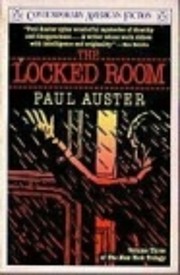

Click on a thumbnail to go to Google Books.
|
Loading... The Locked Roomby Paul Auster
 No current Talk conversations about this book.   ) )The Locked Room is the final book of the New York Trilogy. I wrote reviews of the previous novels in sections, each an impression after completing one book of the three. I expected to gain insights into the previous books as I finished subsequent books. I was mistaken. The New York Trilogy's main story is told in The Locked Room. The unnamed author, who narrates this novel and who appears at the end of the previous two novels, is tasked by his childhood friend Fanshawe with curating his literary opus. This assignment is conveyed via Fanshawe's widow. Like the characters in the previous novels, Fanshawe's significance to the novel is defined by his absence from the novel. Also similar to the previous novels, the narrator loses touch with reality during his winding journey to find Fanshawe. In the end, however, the story told is independent of those told in City of Glass and Ghosts. The truth in the fictive author's claim that "these three stories are finally the same story" refers to the repetitive nature of each novel's plot; the three novels remain only tangentially connected. Similar to both City of Glass and Ghosts, The Locked Room is a well-written, somewhat entertaining novel, but I wouldn't include it on my must-read list. While the narrator's story is ultimately resolved, his mysterious appearances at the end of each of the previous two novels makes him essentially irrelevant to those novels. With some minor revision (explaining who Peter Stillman is within this novel or, better yet, omitting him altogether), this novel could stand on its own. That leaves me confused why these three novels are considered a trilogy, which diminishes their ultimate value. Aun cuando se pueden leer por separadas las tres novelas y tener sentido, es ésta la que viene a ligar a todas con un hilo conductor casi invisible. Los tres tomos tienen en común: detectives, alguien que 'desaparece' (en ocasiones, transformarse puede ser desaparecer de tu contorno cotidiano) y la Literatura. “It seems to me now that Fanshawe was always there. He is the place where everything begins for me, and without him I would hardly know who I am.” So begins ‘The Locked Room’, Paul Auster’s final novel in his ‘New York Trilogy’ where an unnamed 1st person narrator tells the tale using the simple, straightforward language of detective fiction. In this way, the novel makes for easy reading. But underneath this hard-boiled linguistic skin, oh my goodness, we encounter the narrator, a writer by profession, navigating the choppy waters of passion and commitment, forever brooding on an entire range of topics: life and death, self and other, childhood and memory, friendship and fatherhood, love and hate, reading and writing, self-definition and self-identity. In a strange, offbeat way, all the philosophic reflections and ruminations give Auster’s short novel an irresistible drive. Fanshawe was a writer, leaving boxes of novels, journals, poetry and plays to be read and judged. Fanshawe also leaves his beautiful wife, Sophie, and his baby boy. Sophie contacts the narrator, who was Fanshawe’s dearest friend, to do the reading and judging. To tell more than these few facts would be to tell too much. Let me simply say that once I started reading ‘The Locked Room’, I couldn’t put it down. no reviews | add a review
Is contained inCollected Novels Volume 1 by Paul Auster (indirect)
This is the third and last volume of New York Trilogy. Just as the book titles have little to do with what the books are about so does the overall title. This is the story of a man's search for himself and loosing those parts of himself that he doesn't like. Auster has used himself for many parts of the protagonists, and has split his personality into many personae. No library descriptions found.
|
Current DiscussionsNonePopular covers
 Google Books — Loading... Google Books — Loading...GenresMelvil Decimal System (DDC)813.54Literature English (North America) American fiction 20th Century 1945-1999LC ClassificationRatingAverage: (3.76) (3.76)
Is this you?Become a LibraryThing Author. |
||||||||||||||||||||||||||||||||||||||||||||||||||||||||||||||||||||||||||||||||||||||||||||||||||||||||||||||||||||||||||||||||